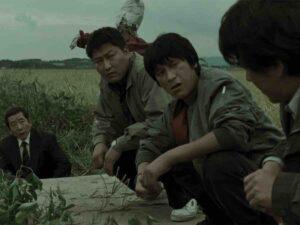South Korean cinema has been on a roll scaling unprecedented, global heights. Bong Joon-ho, one of the many acclaimed South Korean directors responsible for South Korea’s global clout in the film industry, rose to fame in recent years with his award-winning film Parasite (2019). Bong has truly invigorated the crime thriller genre and proven that he is deserving of the accolades. He was able to skillfully concoct an immaculate and beautifully written recipe of suspense intermeshed with a masterful balance of comedy and tragedy. His style of incorporating mind-boggling, unpredictable twists with a subtlety are what makes Parasite an impeccable, unforgettable film.
Needless to say, the buzz surrounding Parasite intrigued fans to discover some of his older works such as Memories of Murder (2003). Regardless of the rather straightforward narrative, the film is an exemplary classic crime thriller and arguably Bong’s best film. Loosely based on the first serial murders that plagued Hwaseong, Korea between 1986 and 1991, Memories of Murder follows the efforts of inept detectives in tracking down the serial killer. Park Doo-man, played by Song Kang-ho, is a local detective who claims he has a knack for seeing through people and believes that his intuition alone is enough to find the culprit.
He along with his hot-headed partner, Cho Yong-koon, played by Kim Roi-ha, repeatedly disregard police procedure, resort to violence and torture to get the suspects to confess. Detective Park’s and Cho’s incompetence is highlighted in the opening scene where they’re unable to keep curious bystanders away from the crime scene of one of the murdered victims. They even resort to tampering and fabricating evidence so as to frame mentally-handicapped Baek Kwang-ho as the culprit, who’s actually innocent and a potential witness to one of the murders.
Even when a well-trained Detective, Seo Tae-yoon, is roped in from Seoul to help the local detectives with their investigation, they don’t make much headway. In fact, Detective Seo doesn’t see eye-to-eye with Detective Park’s regressive, rural methods, resulting in friction and frayed tempers.
Bong’s style of exploiting this ideological conflict by interjecting humor, while at the same time maintaining the seriousness and gravity of each case, is cleverly done in Memories of Murder.
With no actual leads and the killer still at large, Detective Park goes to the extent of visiting a shaman to seek advice. He even visits saunas to look at men’s genitals because of his instinct that the killer is hairless, since he does not leave anything behind after raping and murdering his victims. Park also forces a male cop to crossdress in an attempt to get a confession out of his suspect.
With the serial killer always a step ahead, Bong’s humor is cleverly rooted in the frustration of the failing detectives. This desperation and helplessness is reflected even in righteous Detective Seo when he goes berserk and resorts to violence at the end of the film, deciding that the last suspect is indeed responsible for the crimes, despite the suspect’s DNA results not matching with the culprit.
Furthermore, in one of the scenes where the detectives have a meal at a local diner, the news about the police’s unnecessary use of violence against innocent suspects playing on television results in an uproar between the local diners and the detectives. The fact that their actions are causing the local population to regard them with hostility, illustrates the unstable political climate of South Korea in the 1980s.
In the film, this is especially evident when the detectives are denied a request for a garrison for a stakeout because the troops were busy managing a protest demonstration.
During one of the air raid drills, Bong forces us to watch in horror as the killer successfully takes another life. The slow takes and closeups of the victim’s face, and military sirens blaring and overlapping with the victim’s helpless cries in the background, further emphasize the fact that the militaristic government is equally responsible for the death of the woman as the serial killer. Therefore, the opening scene of a little boy mocking Detective Park as he inspects a dead body in a drain, not only highlights the comic futility of the police seeking justice for violent crimes, but also reflects the ridiculousness of it all when the country itself is in turmoil.
The viewer participates closely with the detectives in trying to crack the case but fails time and again, just like the detectives. The iconic final shot of Detective Park is a great end to the film as he breaks the fourth wall and looks directly and helplessly into the camera, as if searching for the culprit.
Kim Hyeong-gu’s cinematography also perfectly gives the narrative the appropriate somber mood through the apparent lack of saturation in the film, almost looking black and white throughout. Rich lighting is only used in the opening and closing scenes in the green-and-golden rice fields. In the rest of the film the lack of light or sunlight thereof is depicted to give way to dark skies and nights, appropriately representing the country’s socio-political climate when the crimes were committed. In addition, the characters are constantly seen in dark colors, except for some of the victims contrasting red clothing.
Bong excels at reflecting the emotional texture of both the time and place while emphasizing on the central metaphors of its narrative.
On the surface, Memories of Murder seems to be a story about detectives hunting down a serial murderer but as we look closer and analyse deeper, it reflects the memories and collective trauma of a nation during the 1980s socio-political climate of South Korea, where the incompetence of the country’s political climate, more specifically its own authoritarianism, allowed the killer to flourish. An epitome of the crime thriller genre, Memories of Murder is a must watch!
